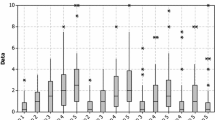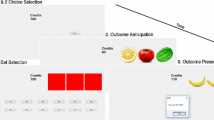Abstract
Four hundred and eighty-five people were asked about their intentions to play the National Lottery in England a week prior to the introduction of a new midweek draw. We predicted that those people who played the Saturday game with a regular set of numbers would be more inclined to play the new midweek game than those who had not established a routine of using the same set of numbers. We further predicted that their motivation to play would derive from a feeling of 'anticipatory regret'—a sense that they would find it intolerable to discover their regular numbers had been drawn when they hadn't purchased a ticket. Results supported both of these predictions, and an interpretation of the data is given in terms of the circumstances most likely to trigger such counterfactual reasoning.
Similar content being viewed by others
REFERENCES
Augoustinos, M. and Walker, I. (1995). Social Cognition. London: Sage Publications.
Clotfelter, C.T. and Cook, P.J. (1993). The gambler's fallacy in lottery play. Management Science, 39, 1521–1525.
Davis, C.G., Lehman, D.R., Wortman, C.B., Silver, R.C. and Thompson, S.C. (1995). The undoing of traumatic life events. Personality and Social Psychology Bulletin, 21, 109–124.
Feldman, J., Miyamoto, J. and Loftus, E.F. (1999). Are actions regretted more than inactions? Organizational Behavior and Human Decision Processes, 78, 232–255.
Gilovich, T. and Medvec, V.H. (1994). The temporal pattern to the experience of regret. Journal of Personality and Social Psychology, 67, 357–365.
Herring, M. and Bledsoe, T. (1994). A model of lottery participation-demographics, context and attitudes. Policy Studies Journal, 22, 245–257.
Kahneman, D. and Tversky, A. (1982). The simulation heuristic. In D. Kahneman, P. Slovic, & A. Tversky (Eds.), Judgment under certainty: Heuristics and biases (pp. 201–208). New York: Cambridge University Press.
Kahneman, D. and Varey, C.A. (1990). Propensities and counterfactuals: the loser that almost won. Journal of Personality and Social Psychology, 59, 1101–1110.
Langer, E. (1975). The illusion of control. Journal of Personality and Social Psychology, 32, 311–328.
Markman, K.D., Gavanski, I., Sherman, S.J. and McMullen, M.N. (1993). The mental simulation of better and worse possible worlds. Journal of Experimental Social Psychology, 29, 87–109.
Medvec, V.H., Gilovich, T. and Madey, S.F. (1995). When less is more: counterfactual thinking and satisfaction among Olympic medalists. Journal of Personality and Social Psychology, 69, 603–610.
Meyers-Levy, J. and Maheswaran, D. (1992). The influence of temporal distance on consumers' affective and persuasive responses. Journal of Consumer Research, 19, 424–433.
Miller, D.T. and Taylor, B.R. (1995). Counterfactual thought, regret and superstition: How to avoid kicking yourself. In N.J. Roese & J.M. Olson (Eds.), What might have been: The social psychology of counterfactual thinking (pp. 305–331). Mahwah, NJ: Erlbaum.
News Release, 23 October. (1966). Office of the National Lottery: 2 Monck Street, London.
Roese, N.J. (1994). The functional basis of counterfactual thinking. Journal of Personality and Social Psychology, 66, 805–818.
Roese, N.J. (1997). Counterfactual thinking. Psychological Bulletin, 121, 133–138.
Salkovskis, P.M. (1966). Frontiers of Cognitive Therapy. New York: Guildford.
Social Research Programme. (1977). Office of the National Lottery: 2 Monck Street, London.
Wagenaar, W.A. (1988). Paradoxes of Gambling Behaviour. Hove: Lawrence Erlbaum Associates.
Weinstein, N.D. (1980). Unrealistic optimism about future life events. Journal of Personality and Social Psychology, 39, 806–820.
Author information
Authors and Affiliations
Corresponding author
Rights and permissions
About this article
Cite this article
Wolfson, S., Briggs, P. Locked Into Gambling: Anticipatory Regret as a Motivator for Playing the National Lottery. J Gambl Stud 18, 1–17 (2002). https://doi.org/10.1023/A:1014548111740
Issue Date:
DOI: https://doi.org/10.1023/A:1014548111740




